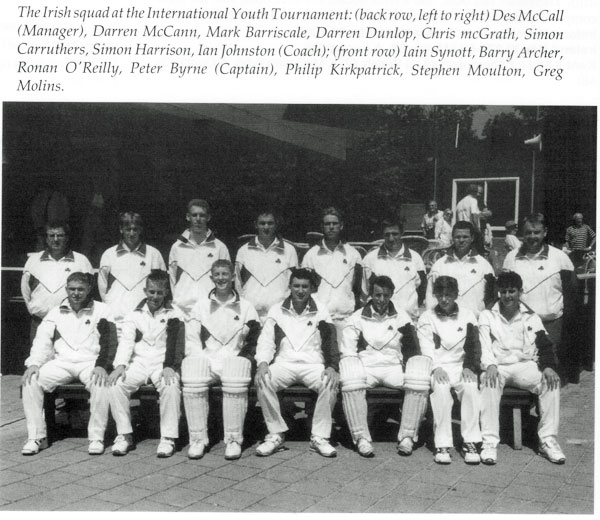This is the story of how 40 Irish internationals started their career in Ireland colours and, along the way, played against 17 England Test stars in the making, including two future captains. The International Youth Tournament is a biennial tournament which, over the years, has featured just nine countries but has led to many reunions. There are omissions and shrewd selections, joy and disappointment. The only thing still missing is an Irish victory in the tournament — sometimes it has been very close.
1975 — Holland
The inaugural International Youth Tournament was known at the time as the International Colts Tournament — an Irish Colts side had been in Holland two years earlier — and included only five countries. England sent two teams, North and South, including future Test players Bruce French, Nick Cook and Tim Robinson and, along with the hosts, Canada and Denmark made up the first line-up.
A last day win over the Danes gave Ireland their only victory for a squad which, uniquely so far, did not include one future senior international. The side was captained by Leinster's Gerry Delaney with Ken Campbell of North Down his vice-captain and manager Michael Moriarty ended the tournament umpiring as Howard Bingham hit the winning run off the penultimate ball. The only member of the squad still playing senior cricket 22 years on was Brian Ferris, still coming round the wicket for Downpatrick. This tournament was dominated by a left-hander with formidable power and timing by the name of David Gower. Before the season was out, the 18 year old was playing for Leicestershire in the Sunday League and, as they say, the rest is history. Ole Mortensen, who was to rip through the Ireland batting for Derbyshire in the 1989 Nat West Trophy, was the best bowler of the tournament.
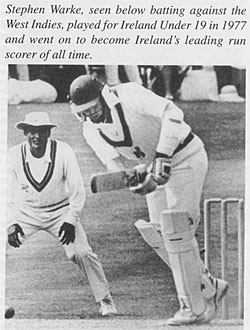 1977 — England
1977 — England
The same six teams contested the second tournament at Charterhouse School with, interestingly nowadays, no restriction on the number of overs per bowler. Looking back through the years, this Ireland team was, unquestionably, the most talented ever sent to the tournament with the six future internationals amassing a total of 363 caps and producing three future captains.
Stephen Warke (114), who scored three half centuries, Paul Jackson (87), was the vice-captain and best wicket keeper in the tournament and Garfield Harrison (118) then still a 16 year old, and under-used, was to be the backbone of the Irish side for a decade and a half while Jim Patterson, virtually everyone would agree, was most unlucky not to make more than 40 senior appearances.
The captain was Brian Gilmore with John McDevitt sharing the new ball with Patterson while Neil Taylor, Colin Magowan and David Johnston all started out here on their way to better than average club careers. The team finished only fourth but no-one got closer to beating the eventual winners, England South, with Jackson, who also topped the batting averages, and Patterson reducing the target of 222 to four off the last ball. They could manage only a single. In this match they also faced the quickest bowler in the tournament, Graham Dilley, then playing for Kent II.
1979 — CanadaGilmore retained the captaincy for the third tournament and Patterson was promoted to vicecaptain, the only two survivors from 1977. Where was Garfield Harrison? Surely one of Ireland's biggest selectorial misjudgements.
This squad actually went one better than the previous one with a still joint record seven players going on to gain full caps. Second place in the tournament — Ireland's best finish until 1997 — emphasised the talent. The wickets were matting and Bermuda took part for the first time, increasing the number of teams to seven. Following a round-robin, two semi finals and a final were played to produce the undisputed winners. Ireland lost the first match to Holland but gained their revenge in the semi final with Mark Cohen and Davy Dennison sharing the match winning partnership. The final was against Bermuda and Cohen's dismissal to the first ball of the second over proved a fatal blow. Jimmy Kirkwood had to be carried from the field after being hit inside the pad but a late flurry from Paul Wallace, who scored consistently and quickly in
most matches, took Ireland to 148 for eight. Robin Haire made the breakthrough after the
opening attack of Patterson and Michael Murphy had failed for the first time but the strokemakers won the day and the tournament debutants won by three wickets in the 49th over. Future England Test players in this tournament included Neil Foster, Martin Moxon and Alan Wells.
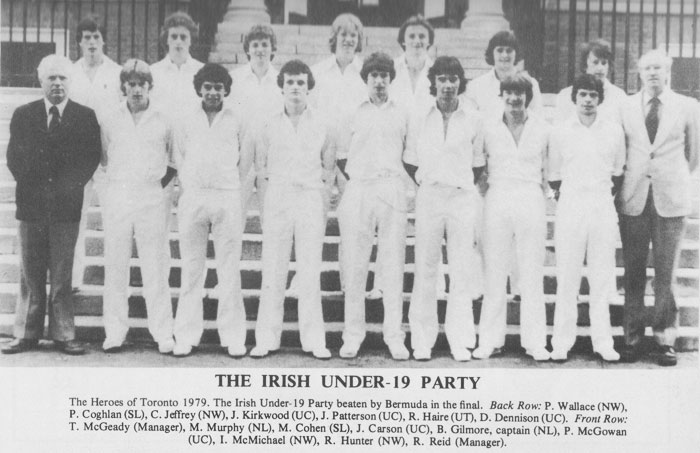
1981 — Denmark
The, by now, established seven teams congregated in Denmark for the fourth tournament with Garfield Harrison chosen as an over-age player, two years after being left out. Significantly, it was the last tournament when over-age players were included as Harrison made a much more meaningful contribution than 1977, this time as vice-captain to Jimmy Kirkwood. Paul Wallace was also selected for his second tournament along with Jimmy Carson but Davy Dennison had been succeeded by his brother Robbie, while three bowlers also took their first tentative steps on the international ladder in this tournament, James McBrine, Alan Jeffrey and Peter O'Reilly, the year before he went to Warwickshire. Harrison, taken to England as an off spinner but not used, was now bowling medium pace and made an excellent start with figures of four for five in his 10 overs against Denmark. Kirkwood's 55 gave Ireland a five wickets victory.
Against the Dutch, Harrison (71) and Dennison (87) put on 130, the highest partnership of the tournament as Ireland scored 212 for five and McBrine held a stunning catch to dismiss Holland's best batsman. Another 68 from Dennison ensured Ireland's first victory against Bermuda but Richard Illingworth, the year before his debut for Worcestershire, took five wickets for England North to leave Ireland in third place thanks to a last day victory against the hosts. Neil Fairbrother, Jack Russell and Phil Newport were also in the England line-ups.
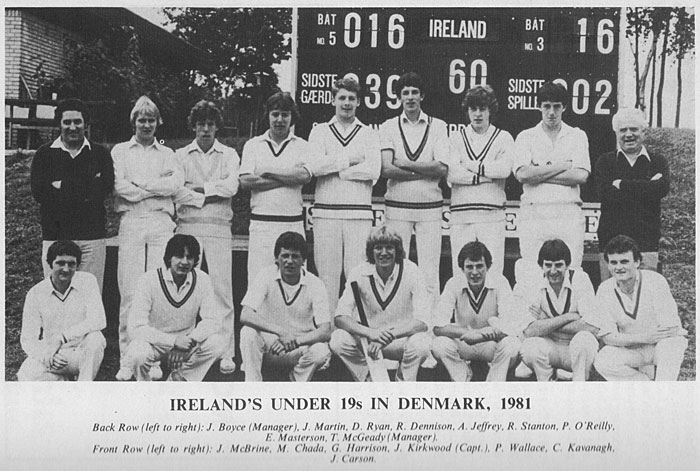
1983 — Holland
Only run-rate denied Ireland a place in the final as one of our strongest teams stormed back with four wins after losing their first two games. Adam McClean was injured in the second match against England North and took no further part in the tournament, but all the other bowlers stuck to their task, no more so than against holders Holland who were restricted to 108 for nine. Ken Boucher finished with two for six from his 10 overs and followed up with four more in the next as Bermuda were dismissed for 107. Ross McCollum, one of seven future internationals, hit 59 in the winning reply.
Robbie Dennison, in his second tournament, hit Ireland's highest score of 84 not out as Ireland chased 220 to beat England South. That innings gave Dennison an average of 39.75 but he still finished second to McCollum. Michael Rea top scored with 61 against England North on his way to a tournament average of 33 but his future international captain and Ireland's most capped player, Alan Lewis, made an inauspicious start to his Irish career with just 35 runs from five innings. Even then, though, he was captain.
The other intemationals-to-be were Charlie McCrum, who hit a 50 in the opening match against tournament winners Denmark, Deryck Vincent, who batted only twice, Johnny Garth, who did better with the ball and Michael Shannon who, like Garth, finished with nine wickets, but still three behind leading wicket-taker Boucher.
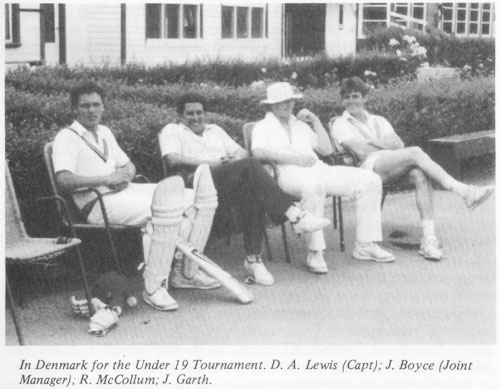
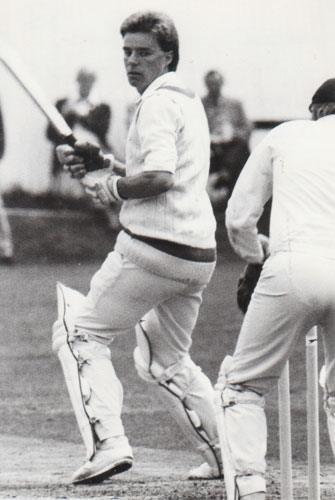 1985 — Bermuda
1985 — Bermuda
Vice-captain Michael Rea (right) hit Ireland's highest individual score in this tournament when Decker Curry burst onto the international scene. Rea scored 109 not out against the Canadians and Curry his first whirlwind 40 against Holland when runs were required in a rain affected match. In all five of the squad were to win international honours including both wicketkeepers, Allan Rutherford, who scored an unbeaten 41 in the opening victory against Denmark, and Brian Millar and Angus Dunlop who top scored against an England North side which included one Michael Atherton. The Ireland side was captained by Old Belvedere's Paul O'Riordan but the all-rounder of the tournament was Jeffrey O'Hara, then of Muckamore, who took nine wickets — only three bowlers took more in the tournament — and also shared an unbroken stand of 70 with Johnny McGrath for the eighth wicket against Bermuda.
It was not enough to beat the hosts, however and defeats by both England sides left Ireland in joint third place. Rea's century, naturally, ensured victory although Keith Finlay also scored a 50 in the same match and O'Hara and Willie Dwyer each took three wickets against Denmark.
1987 — Ireland
The proud hosts of 1987 put out their weakest team for 12 years with only Conor Hoey, the captain, going on to win senior international honours although Shane Harrison, Graeme Hunter and Mark Olphert surely have not yet given up. Wicketkeeper Bruce Topping is, of course, one of Ireland's best badminton players.
With home advantage — the tournament was played in the NCU area with major sponsorship from Ulster Bank — Ireland won three of the six games although their defeat by Bermuda at Wallace Park was in a bowl-out after dismissing the holders for 111. Kevin McCafferty took five for 14 in his first seven overs.
Ireland had opened the tournament at Ormeau with Leon Ellison reducing England South to seven for two, but they recovered to total 194 for seven and future rugby international Ciaran Clarke's 37 was Ireland's top score as they fell 45 runs short. Michael Blair hit 78 off 51 balls in a partnership of 110 in 50 minutes with Mark Clinton against Holland at Pollock Park with Dessie Neill taking three wickets for the second successive match to earn a 94 runs victory. Blair followed up with 74 in a 47 runs success against Denmark at Newforge but it was Hunter who scored an Ireland century for the second successive tournament, 105 against Canada at Comber, and five wickets from Hoey gave Ireland a resounding 193 runs victory — still their biggest in the tournament.
At the other end of the scale they were bowled out for 57 — still their lowest total — by England North in the final game at Eaton Park with Blair again top scoring, with 17. South beat North in the all-England final at Ormeau.
1989 — England
It was a fifth successive third place finish for Ireland as the tournament returned to England for the second time. Radley College, Oxford was the venue for an Ireland side led by John Fitzpatrick and including Eddie Moore and John Power who later made the senior side. The leading wicket taker was Michael Anderson who also topped the averages with seven at 17. His best was three for 15 in the final match against Canada when the captain finally came good with the bat and Ireland's 182 for eight — their best of the tournament — ensured a comfortable victory. Top batsman was Pembroke's Trevor Dagg who scored 64 in the opening match against an England South attack which included Mark Illot and Robert Croft. Their batting wasn't bad either, hitting the Irish attack for 248 for two, without a significant contribution from Matthew Keech. England North were just as strong — John Crawley and Dominic Cork were in the squad — with five wickets from Jeremy Batty against Ireland, and Chris Adams and Paul Grayson were also in their batting lineup. Ireland were bowled out for 68 but took three wickets in reply.
The most exciting match was against Holland with an unbeaten 72 from Brian O'Rourke steering Ireland to a one wicket victory and with the Denmark game abandoned Ireland's other victory was against Bermuda, by six wickets chasing 114, after Fergal O'Doherty and Michael McCord each took three wickets.
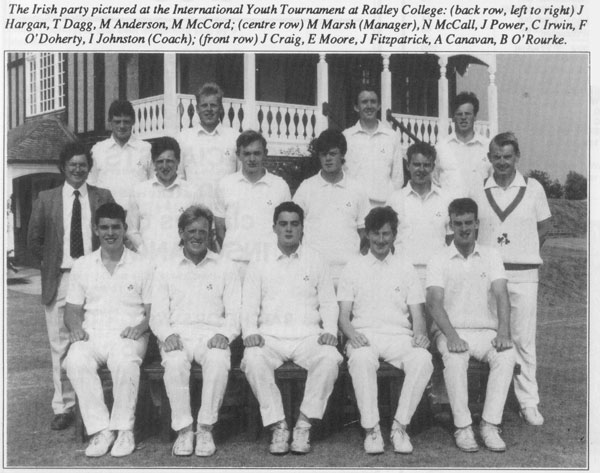
1991 — Canada
Five of the 1991 party have already progressed to the full international team yet only two wins were recorded in a generally disappointing performance. The best was saved to the last when Ireland hammered the hosts by seven wickets thanks to an unbeaten 91 from Johnny Byrne, whose aggregate of 221 runs was the second highest of the tournament. David Cooke finished third in the averages, just behind Neil Carson, thanks to his 48 against Bermuda and an unbeaten 42 in the opener against Holland but his younger North West colleague Peter Gillespie played only two games. The pick of the bowlers was Derek Heasley (right), who finished with eight wickets despite being left out of the first match. Stewart Taylor needed figures of two for 19 in the last to bring his average down to 47 per wicket. The competition was back to six teams, for the first time since 1977, with England's dominance of previous tournaments prompting them to send one Under 18 side. They still won it but only on a tie-break with Bermuda, whom they defeated in their final game.
Ireland scored a respectable 183 for nine in 45 overs against them and it was only the greater experience of the English team, which included Malachy Loye and Glen Chappie, which give them victory by four wickets with just six balls to spare. Neil Carson scored an unbeaten 74 against Bermuda, putting on 110 with Cooke for the fourth wicket as Ireland amassed 238 for four. But it all fell apart in the field and despite three wickets for Heasley, Bermuda won with six overs to spare. It was a game which summed up Ireland's tournament.
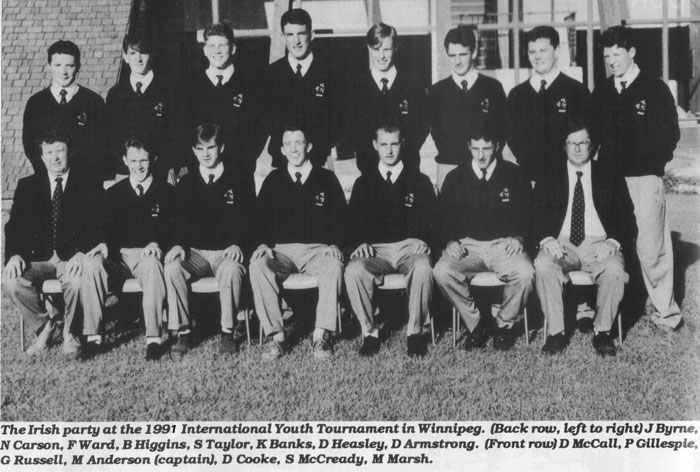
1993 — Denmark
The 10th tournament saw the admission of Zimbabwe alongside the other six countries and the progressing nation beat England in their final match to lift the trophy. Peter Gillespie (right) travelled to his second tournament in a powerful looking squad, captained by Gareth O'Meara, which included future international team-mates Peter Davy, Stephen Ogilby, Mark Patterson, Ryan Eagleson and Gordon Cooke.
There was no room for Kyle McCallan and Andy Patterson who have gone on to prove that selectors do not always get it right although the final finishing place of fifth did Ireland no favours. One of their four defeats was by the minimum margin to Holland as Ogilby was run out off the penultimate ball of the match.
Next day, Zimbabwe were 67 for six, little more than half way to their target, but Cooke, who had taken two for 11 in his first spell injured himself, was unable to come back — indeed he took no further part in the tournament — and despite 10 accurate overs each from Patterson and Eagleson, only one more wicket fell. Two years older than in his tournament debut, Gillespie was given much more opportunity and finished second in the Irish batting averages, behind Gus Joyce, with his best score of 66 in the final match against Canada. The top four in the order, Joyce, Ogilby and Davy, with Ireland's best of 77, all scored half centuries as Ireland totalled 272 for four. Unfortunately, the previous best individual score in the other five games was Ronan O'Reilly's 39 and that's why only two games were won.
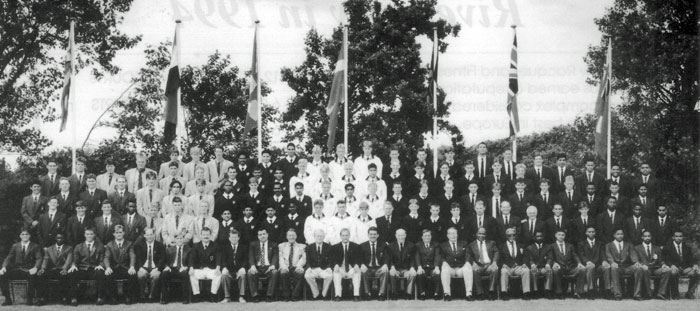
1995 — Holland
It is no coincidence that the start of the Mike Hendrick era in Irish cricket saw the withdrawal of a player originally selected for the International Youth Tournament because he was needed in the senior squad. Stephen Ogilby missed out on the chance of a second IYT because he was called into the Ireland squad for the Triple Crown. If you are good enough you are now old enough and he is unlikely to be the last 19 year old to miss out on this tournament because of a senior call. That left Ronan O'Reilly as the only survivor from 1993 and he continued his improved performance with the bat with 235 runs at an average of almost 59. Only one other batsman, Stephen Moulton, scored more than 100 runs although Greg Molins, the only other player to have made it onto the senior stage so far, averaged 32 as he was out only twice. His unbeaten 33 in the last match against Holland, in which O'Reilly made his top score of 95, sparked Ireland's third victory. The second, their biennial success against Canada, was dominated by an unbeaten 74 from Simon Carruthers and fellow South Africa-bound teammate Simon Harrison and Molins shared seven wickets.
Harrison finished with 11 wickets in the tournament at an average of just 12, including three in the first match against Denmark which was lost by just two wickets. The defeats by England and Scotland, who had replaced Zimbabwe, were not quite so close.
But as manager Dessie McCall said in his report of the 1995 tour (and it could have applied to any of its ten predecessors): 'The important thing is not the winning but the experience gained by our young cricketers. They should see selection for this tournament not as a reward for performances to date but as an opportunity to impress in the hope of gaining further promotion to the senior team.' With more and more players required for the proliferation of international cricket they will never have a better chance.
